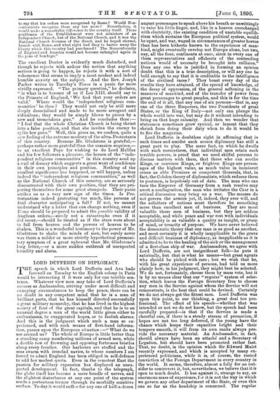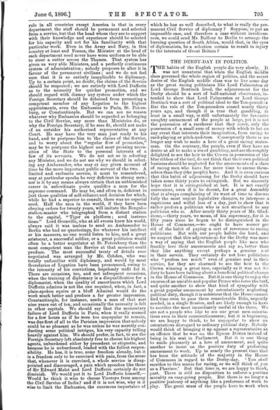LORD DUFFERIN ON DIPLOMACY. T HE speech in which Lord Dufferin
and Ava bade farewell on Tuesday to the English colony in Paris would be interesting if it were only for one terrible sen- tence. Whatever view men may take of Lord Dufferin's success as Ambassador, striving under most difficult and annoying circumstances to keep the peace, there can be no doubt in any competent mind that he is a man of brilliant parts, that he has himself directed successfully a great military monarchy, that he has lived in the highest society of four of the great capitals, and that he is to an unusual degree a man of the world little given either to enthusiasms, to exaggerated hopes, or to foolish alarms. And this is the judgment which such a man so ex- perienced, and with such means of first-hand informa- tion, passes upon the European situation :—" What do we see around us ? The whole of Europe is little better than a standing camp numbering millions of armed men, while a double row of frowning and opposing fortresses bristles along every frontier. Our harbours are stuffed and the seas swarm with ironclad navies, to whose numbers I am forced to admit England has been obliged in self-defence to add her modest quota. Even in the remotest East the passion for military expansion has displayed an unex- pected development. In fact, thanks to the telegraph, the globe itself has become a mere bundle of nerves, and the slightest disturbance at any one point of the system sends a portentous tremor through its morbidly sensitive surface. To-day it would suffice for any one of half-a-dozen august personages to speak above his breath or unwittingly to raise his little finger, and, like in a heaven overcharged with electricity, the existing condition of unstable equilib- rium which sustains the European political system, would be upset, and war, waged in circumstances of greater horror than has been hitherto known to the experience of man- kind, might eventually envelop not Europe alone, but two, nay, all the four, continents at once, since in every one of them representatives and offshoots of the contending nations would of necessity be brought into collision." Does any one who is justified in forming an opinion doubt that this is a true description, or will any one be bold enough to say that it is creditable to the intelligence of the civilised races ? They boast every day of the results they have attained, of the spread of knowledge, of the decay of oppression, of the general softening in the manners of mankind, and of the transfer of power from great personages to great peoples, and this is for the time the end of it all, that any one of six persons—that is, any one of the three Emperors, the two Presidents of great States, or the King of Italy—not only can plunge the whole world into war, but may do it without intending to bring on that huge calamity. And then we wonder that statesmen sometimes grow cynical, or lament that they shrink from doing their duty when to do it would be to fire the magazine.
Lord Dufferin is doubtless right in affirming that in such times and amidst such scenes diplomacy has still a great part to play. The mere fact, on which he dwells with such earnestness, that individual men retain such terrible powers, is proof that we need skilful persons to discuss matters with them, that those who can soothe Kings, or convince Kings, or frighten Kings are person. ages of the highest value, as much value in imminent crises as able Premiers or competent Generals, that, in fact, the Cobden theory of diplomatists, which reduces them to postmen, is hopelessly out of date. The man who can turn the Emperor of Germany from a rash resolve may avert a conflagration, the man who irritates the Czar in a critical discussion may bring on a war. The masses do not govern the armies yet, if, indeed, they ever will, and the solicitors of nations must therefore be something more than excellent men of business. They are most valuable those men of business, but they are seldom acceptable, and while peace and war rest with individuals acceptability is as valuable a quality as insight, or grasp of mind, or tenacity of purpose. We have never believed the democratic theory that one man is as good as another, and most certainly it is wholly inapplicable to the grave and difficult business of diplomacy, as inapplicable as it is admitted to be to the healing of the sick or the management of a first-class ship of war. Ambassadors, we agree with Lord Dufferin, are not insignificant folk—he puts it satirically, but that is what he means—but great agents who should be picked with care ; but we wish that he, with his great experience of persons, had told us more plainly how, in his judgment, they might best be selected. We do not, fortunately, choose them by mass vote, but it is by no means clear that our " regular" system of selec- tion, which leaves the Foreign Secretary free to choose any men in the Service against whom the Service will not remonstrate, is the best that could be devised. Certainly we do not always get the fittest men. Lord Dufferin was upon this point, to our thinking, a great deal too pro- fessional. The effect of his speech—whether that was intended or not we do not know, but the speech had been carefully prepared—is that if the Service is made a cheerful one, if there is a steady stream of promotion, if hopes are not too long deferred, if the young have the chance which keeps their capacities bright and their tempers smooth, it will from its own ranks always pro- vide the necessary material. An Ambassador, in fact, should always have been an attache and a Secretary of Legation, but should have been promoted rather fast. That, no doubt, is the opinion which Sir Edward Malet recently expressed, and which is accepted by many ex- perienced politicians, while it is, of course, the rooted conviction of the Foreign Department in every country in the world. It seems, therefore, almost a folly for an out- eider to controvert it, but, nevertheless, we believe that it is open to much doubt. It has against it, strange to say, an enormous mass of experience, for it is not the way in which we govern any other department of the State, or even this one so far as the headship is concerned. The regular rule in all countries except America is that in every department the staff should be permanent and selected from a service, but that the head whom they are to support with their knowledge and experience should be selected for his capacity and not for his familiarity with that particular work. Even in the Army and Navy, in this country at least and France, the Minister at the head of each department need never have worn uniform or be able to steer a cutter across the Thames. That system has given us very able Ministers, and a perfectly continuous system of administration; nobody proposes to alter it in favour of the permanent civilians ; and we do not feel sure that it is so entirely inapplicable to diplomacy. Up to a certain point, no doubt, the claims of the Service should be respected ; we are entirely with Lord Dufferin as to the necessity for quicker promotion, and we should regard with dismay any system under which the Foreign Secretary should be debarred from promoting a competent member of any Legation to the highest appointments, even the Embassies to Paris, St. Peters- burg, or Constantinople. But we can see no reason whatever why Embassies should be regarded as belonging to the Civil Service, any more than Ministries do, or why the Foreign Secretary, if he sees fit, should not make of an outsider his authorised representative at any Court. He may have the very man just ready to his hand, and to postpone him to the claims of the Service, and to worry about the "regular flow of promotion," may be to postpone the highest and most pressing neces- sities of the State to the personal interests of a few of its servants. We do not act so in selecting any Minister, and we do not see why we should in select- ing any Ambassador, who may at any given moment of time be the more important public servant of the two. A limited and exclusive service, it must be remembered, may at particular epochs be very deficient in strong men ; nor is it by any means always certain that an unblemished career in subordinate posts qualifies a man for the supreme command. He may be, and often is, deficient in just those qualities of self-reliance and decision for which, while he had a superior to consult, there was no especial need. Half the men in the world, if they have been obeying orders for twenty years, will imitate the Bengalee station-master who telegraphed from a distant station to the capital, " Tiger on platform ; send instruc- tions." Lord Granville, who at all events knew his world, always said it was useless to send an Ambassador to Berlin who had no quarterings, for whatever his intellect or his manners, no one would listen to him, and a great aristocrat, a successful soldier, or a great politician would often be a better negotiator at St. Petersburg than the most competent man the Service at that moment could produce. The most successful treaty of details ever negotiated was arranged by Mr. Cobden, who was totally unfamiliar with diplomacy, and would by most Secretaries of Legation have been pronounced, owing to the intensity of his convictions, hopelessly unfit for it. There are occasions, too, and not infrequent occasions, when the training of diplomacy is a disqualification for a diplomatist, when the quality of smoothness which Lord Dufferin admires is not the one required, when, in fact, a plain-spoken squire or a bluff Admiral would do the work much better and produce a far greater impression. Constantinople, for instance, needs a man of that sort nine years out of ten, and occasionally the necessity is felt in other capitals. We should say that the momentary failure of Lord Dufferin in Paris, when it really seemed for a few hours as if he were too unpopular to remain, was due first of all to the Parisian impression that nobody could be so pleasant as he was unless he was secretly con- ducting some political intrigue, his very capacity telling heavily against him. We should prefer, in fact, to see the Foreign Secretary left absolutely free to choose his highest agents, unburdened either by precedent or etiquette, and because he is unburdened, loaded with the fullest respon- sibility. He has, it is true, some freedom already, but it is a freedom only to be exercised with pain, from the sense that, whenever it is exercised, a whole service is disap- pointed and discouraged, a pain which speeches like those of Sir Edward Malet and Lord Dufferin certainly do not diminish. We would put it to Lord Dufferin himself,— Would he think it wise to choose Viceroys from among the Civil Service of India? and if it is not wise, why is it wise to limit the Embassies, the enormous importance of which he has so well described, to what is really the per- manent Civil Service of diplomacy ? Suppose, to put an impossible case, and therefore a case without invidious- ness, we could send Mr. Balfour to Berlin to arrange the burning question of South Africa, would that, in the eyes of diplomatists, be a selection certain to result in injury to the interests of Great Britain P







































 Previous page
Previous page